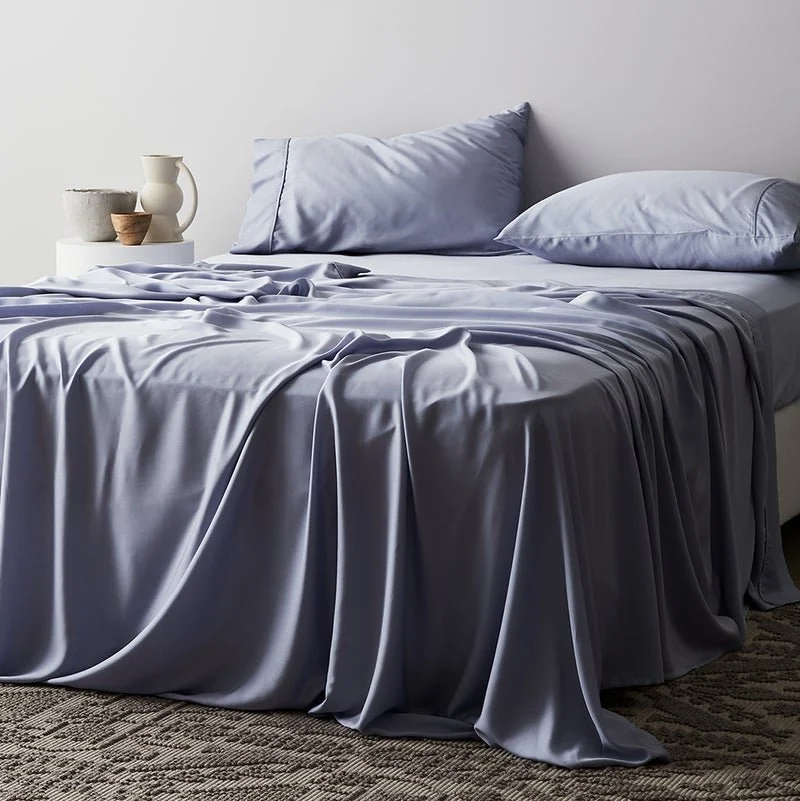The Best Natural & Organic Pillows
You’ve heard it said time and again: sleep is important. For adults, between seven and nine hours a night are recommended for rest and rejuvenation.
A pillow can be one of the factors that make or break a good night’s rest. It’s important for support and comfort, especially for your head and neck to maintain proper alignment with the spine.
When choosing pillows you need to consider what works best for you: if you’re a side sleeper, you may need a higher loft pillow, with lower loft pillows working better for those who sleep on their backs.
While you’re thinking about sleeping positions and pillow loft, you’ll also want to keep in mind the materials the pillow is made of, because what you choose can have benefits for your health and the environment.
You need to think about both the fill and the outer shell or covering – and with a push towards sustainable homes, including what’s in our bedrooms, many have turned to natural and organic materials.
This post does contain some affiliate links which means The Honest Consumer may receive a commission if you decide to purchase, however, at no additional cost to you!
What Materials in Pillows Can be Organic?
For a pillow to be completely organic it needs to follow organic protocol from start to finish: from the natural fibers sourced to the processing and manufacturing of materials and the end product.
Both the fill and the shell need to be organic too. You can find pillows that may have an organic shell but a synthetic filling or vice versa; or the pillow could have a natural fill and a natural shell, but both may not be organic.
But some organic materials are definitely better than none!
When it comes to the sourcing of materials (e.g. cotton crops) no pesticides or chemical fertilizers may be used. Organic agriculture has strict standards for reducing water usage and pollution, and farming methods must work with the surrounding ecosystem.
In the case of animals, feed and pastures must be organic, synthetic hormones are prohibited, and the animals’ welfare must be protected.
When it comes to the processing and manufacturing of materials and the end product, fewer or ideally no chemicals or harsh treatments may be used. Here are some of the natural materials used for pillows.
Cotton: A cool, cruelty-free, compostable option that is free from odors. This is a great option for hot sleepers.
Natural latex: It is made from rubber tree sap, as opposed to synthetic latex which is made from petroleum-based, man-made styrene-butadiene rubber (SBR). Organic latex uses less chemicals to process and when used for pillow fills, is available as shredded or as solid foam.
Wool: Sourced from sheep, goats, rabbits, camels, alpacas, and llamas, they are naturally mold- and flame-resistant.
Buckwheat hulls: Firm and adjustable, buckwheat fills offer great support while also regulating temperature well – just bear in mind that they are noisier and heavier than other materials.
Down and feathers: Sourced from ducks and geese, these pillows are lightweight, easy to care for, and adapt well to your shape.
Silk: Sourced from silkworms, it is great for your skin and hair, but an expensive and high-maintenance material.
Kapok tree fiber: Down alternatives are often synthetic so rather opt for kapok fibers. It’s plant-based, making it ideal for vegans. Alternatively, search for synthetic down alternatives that have an organic shell.
Bamboo: Be wary of greenwashing with this material. While bamboo is a natural material that is organically grown because it does not require any pesticides or fertilizers to grow, most of what we see in stores (e.g. “made with bamboo”) has been mixed with a semisynthetic material known as rayon. This process can require a lot of toxic chemicals to process and thus it cannot be organic. A truly bamboo material would be coarse and not ideal for pillows or even clothing. If you choose to go the bamboo pillow route be sure the semi-synthetic process is done as sustainable as possible.
Natural vs. Synthetic Materials
There are many reasons to choose a natural pillow over pillows made or filled with a synthetic material like polyester. Pillows made from natural materials are breathable and better at regulating your temperature, while synthetics tend to overheat.
While the former are often expensive, they are usually more durable and so can last longer. Polyester fills in pillows develop lumps over time and get flattened.
Natural fabrics can be a good sleeping solution for those with respiratory problems (like asthma), allergies, or skin sensitivities because they have hypoallergenic and anti-bacterial qualities.
However, while natural materials can help with certain health problems, bear in mind that some people may have allergies to wool, feathers, or down.
The latter three are also not appropriate for vegans as they are sourced from animals. Organic cotton and organic latex are good natural alternatives for vegans.
Health and Environmental Benefits of Choosing Organic Pillows
As mentioned, natural materials can be good choices for those with respiratory problems, skin sensitivities, or allergies, more so if they are organic because the presence of fewer or no chemicals makes the end product even gentler on your skin.
Conventional pillows (i.e. non-toxic and synthetic pillows) may expose us to trace amounts of toxic ingredients.
These include flame retardants and formaldehyde, which have been linked to negative health impacts like endocrine disruption and even cancer. Bedding, including pillows, is also notorious for off-gassing volatile organic compounds (VOCs).
Because organic practices take into account pollution, wastewater treatment, and water usage, as well as how farming methods work with the surrounding environment, organic pillows can be more eco-friendly.
Using natural materials can also have benefits for the environment, because synthetics like polyester are petroleum-based, which entails digging into the Earth’s resources using energy-intensive and polluting processes that contribute to deforestation and biodiversity loss, as well as human-induced climate change due to the high levels of greenhouse gases that are emitted.
Buckwheat hulls are one of the most sustainable choices because they are low impact, require minimal energy to make fillings, and are biodegradable. Wool and cotton are also biodegradable; however, cotton is very water-intensive.
If you use animal-derived products but want to ensure the animals are treated humanely, there are certifications to guide you in choosing the best pillows.
5 Natural & Organic Pillow Brands for a Good Night’s Sleep
If you're looking for some of the best organic pillows free from harmful chemicals these eco-friendly brands are all a good option. Discover natural latex pillows, organic cotton pillows, kapok pillows, and more!
Savvy Rest's Organic Pillows Made in the USA
All Savvy Rest organic pillows have unbleached, naturally-colored organic cotton casings with a soft flannel finish and customizable loose fill with options including shredded natural latex, organic wool, a wool-natural latex blend, or organic kapok fiber.
Savvy Rest pillows are ethically made in the USA. This certified B Corporation has a few give back initiatives too.
For each purchase made, Savvy Rest plants trees through their partnership with American Forests. Savvy Rest gives back further by donating pillows to domestic violence shelters. Savvy Rest's pillows range from $109-$250.
Plush Beds A Non-Toxic Pillow for Everyone
Plush Beds offers pillows made from organic latex, goose and down, and wool. For the latex pillows, you can choose from a shredded or solid fill and both are encased in organic cotton.
Their down options consist of a goose down cotton sateen pillow and the chamber down and feather pillow, both certified by the Responsible Down Standard.
For vegans or those with allergies or sensitivities, there is a down alternative made with a microfiber polyester fill and a 100% cotton sateen cover.
Their wool pillows are ethically sourced, handmade in the USA, and free from chemicals. Plush Bed's organic pillows range from $99-$150.
Saatva’s CertiPUR-US Memory Foam & Organic Cotton Pillows
Saatva has a range of options when exploring natural and organic pillows.
The Saatva Pillow is made with organic, Fair Trade Certified cotton and natural latex that is free of harmful chemicals and VOCs (and also antimicrobial and resistant to mildew, dust mites, and indoor allergens).
The Saatva Down Alternative pillow is made with organic cotton and 100% hypoallergenic. The Graphite Memory Foam Pillow and the Cloud Memory Foam pillows are made with 100% CertiPUR-US® certified memory foam and feature an organic cotton knit cover.
Plus, select pillows are responsibly made right here in the USA. Saatva’s pillows range from $115-$185.
Avocado's Organic Pillows for Everyone
From beds and mattresses to toppers and protectors, Avocado specializes in organic bedding.
Their Avocado Green Pillow is made with GOLS certified latex and a GOTS certified kapok fill, an organic jersey cotton liner, and a machine washable GOTS certified cotton quilted cover.
It is also vegan and GREENGUARD Gold certified. For a firmer pillow, there’s Avocado’s Molded Latex Pillow made with a charcoal-infused latex core and encased in a GOTS certified cotton cover.
Avocado also offers organic pillows for yoga meditation, toddlers, and mini pillows perfect for traveling.
For the ultimate spoil, there’s the Organic Luxury Plush Pillow made with a Talalay latex core and surrounded by wool silk mohair and a GOTS certified cover. Avocado's non-toxic pillows range from $34-$229.
Boll & Branch's Down Pillows with Organic Cotton Cover
If you’re looking for down or feather pillows, Boll & Branch is your go-to. While best known for their fair trade organic cotton sheets, they also offer pillows with down fills that have been triple washed with environmentally-safe, Bluesign® certified detergent.
The down fill has been responsibly sourced from American farms. The outer shell is made from organic cotton that is down-proof, meaning your pillow won’t leak down.
They have vegan options filled with Primaloft®, a down alternative made from a synthetic microfiber; however, the cover is 100% organic cotton.
There are also decorative pillows available, made with a feather and down blend and covered in organic, down-proof cotton. Boll & Branch pillows range from $58-$158.
Third-Party Certifications to Look For
Along with anti-cruelty certifications for animals, there are labels that can help you choose organic, non-toxic pillows.
For pillows using fewer or non toxic ingredients look for:
MADE SAFE: Checks that products are made with safe ingredients.
OEKO-TEX Standard 100: Tests for harmful substances.
Eco-Insitut: Tests for pollutants and emissions in bedding.
CertiPUR-US: Checks that products are not made with flame retardants.
Standard GREENGUARD ensures low VOC emissions. GREENGUARD Gold is stricter ensuring even fewer or zero VOC emissions.
For animal-derived products:
Responsible Down Standard: Protects the welfare of ducks and geese, ensuring that there is no force feeding or live plucking.
Responsible Wool Standard: Protects the welfare of sheep and the land they graze on.
For organic certification:
Made in Green: Part of OEKO-TEX®, it awards products that adhere to good sustainability and ethical standards.
USDA: (United States Department of Agriculture): Ensures organic practices are in place. However, this is only for the crop and not non-food end products like pillows. To cover manufacturing and production too, look for GOTS and GOLS labels.
Global Organic Textile Standard (GOTS) and Global Organic Latex Standard (GOLS): Tests and verifies organic cotton and latex. To receive GOTS certification, materials must contain at least 70% organic materials, and 95% organic materials for latex.
Tips for Picking Out a Organic Pillow
While picking out a new pillow can be overwhelming here are a few things to consider!
Determine which type. of support you want. Do you prefer firm support or more of a soft pillow?
Consider the position you sleep in. Some pillows are better for back sleepers, stomach sleepers, or side sleepers.
Consider what size pillow you need. Are you looking for a standard sizes pillow or king sizes?
Decide what type of materials you want organic wool, organic cotton, etc?
Hopefully this guide has helped you find a great alternative for the next time you replace your pillows with eco-friendly pillows. Your pillows are sure to compliment the organic textiles on your bed and organic mattress for the most sustainable bedroom!
For more ethical & sustainable fashion tips be sure to follow The Honest Consumer on social media, subscribe to our newsletter, & check out the Ethical & Sustainable Brand Directory.






















